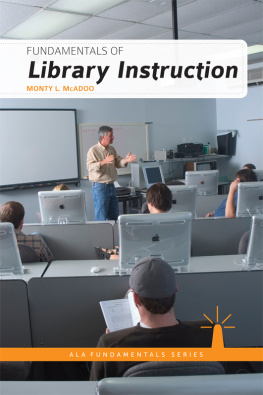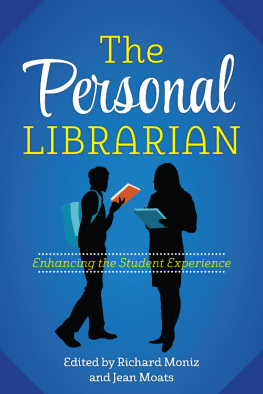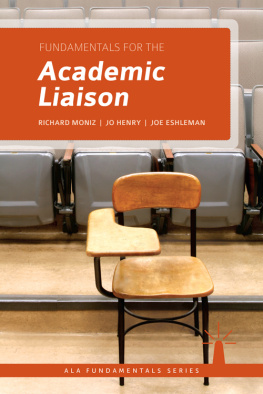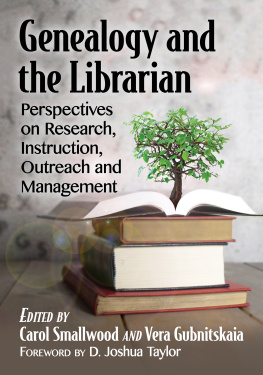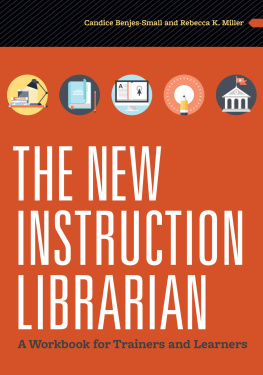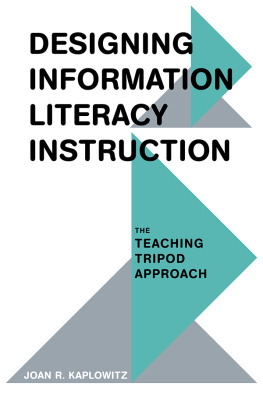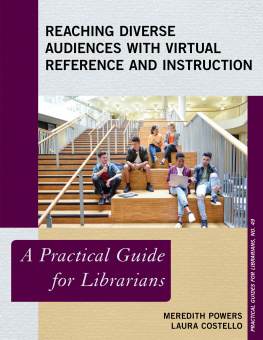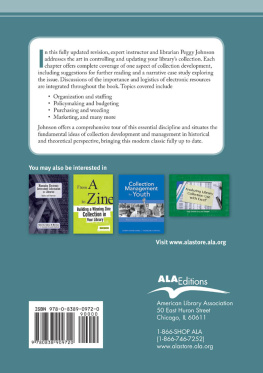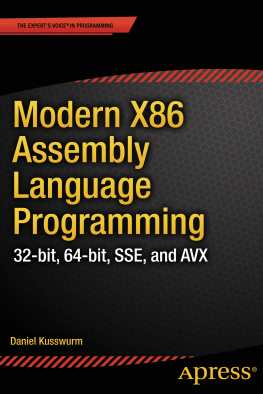Dr. Monty L. McAdoo - Fundamentals of Library Instruction
Here you can read online Dr. Monty L. McAdoo - Fundamentals of Library Instruction full text of the book (entire story) in english for free. Download pdf and epub, get meaning, cover and reviews about this ebook. year: 2012, publisher: American Library Association, genre: Romance novel. Description of the work, (preface) as well as reviews are available. Best literature library LitArk.com created for fans of good reading and offers a wide selection of genres:
Romance novel
Science fiction
Adventure
Detective
Science
History
Home and family
Prose
Art
Politics
Computer
Non-fiction
Religion
Business
Children
Humor
Choose a favorite category and find really read worthwhile books. Enjoy immersion in the world of imagination, feel the emotions of the characters or learn something new for yourself, make an fascinating discovery.
- Book:Fundamentals of Library Instruction
- Author:
- Publisher:American Library Association
- Genre:
- Year:2012
- Rating:3 / 5
- Favourites:Add to favourites
- Your mark:
- 60
- 1
- 2
- 3
- 4
- 5
Fundamentals of Library Instruction: summary, description and annotation
We offer to read an annotation, description, summary or preface (depends on what the author of the book "Fundamentals of Library Instruction" wrote himself). If you haven't found the necessary information about the book — write in the comments, we will try to find it.
Fundamentals of Library Instruction — read online for free the complete book (whole text) full work
Below is the text of the book, divided by pages. System saving the place of the last page read, allows you to conveniently read the book "Fundamentals of Library Instruction" online for free, without having to search again every time where you left off. Put a bookmark, and you can go to the page where you finished reading at any time.
Font size:
Interval:
Bookmark:
ALA Fundamentals Series
FUNDAMENTALS OF CHILDRENS SERVICES by Michael Sullivan
FUNDAMENTALS OF LIBRARY INSTRUCTION by Monty L. McAdoo
FUNDAMENTALS OF LIBRARY SUPERVISION by Joan Giesecke and Beth McNeil
FUNDAMENTALS OF REFERENCE by Carolyn M. Mulac
FUNDAMENTALS OF TECHNICAL SERVICES MANAGEMENT by Sheila S. Intner, with Peggy Johnson
SMALL PUBLIC LIBRARY MANAGEMENT by Jane Pearlmutter and Paul Nelson
Fundamentals of Library Instruction
Monty L. McAdoo
ALA FUNDAMENTALS SERIES
American Library Association: Chicago 2012
Monty L. McAdoo is research and instruction librarian of the Baron-Forness Library at Edinboro University of Pennsylvania. His research interests include faculty understanding and use of information literacy and information technology. McAdoo earned his masters degree in library science at the University of Pittsburgh and his doctorate of education in administration and leadership studies at Indiana University of Pennsylvania.
2012 by the American Library Association. Any claim of copyright is subject to applicable limitations and exceptions, such as rights of fair use and library copying pursuant to Sections 107 and 108 of the U.S. Copyright Act. No copyright is claimed for content in the public domain, such as works of the U.S. government.
Extensive effort has gone into ensuring the reliability of the information in this book; however, the publisher makes no warranty, express or implied, with respect to the material contained herein.
ISBNs: 978-0-8389-1141-9 (paper); 978-0-8389-9415-3 (PDF); 978-0-8389-9414-6 (ePub); 978-0-8389-9416-0 (Mobipocket); 978-0-8389-9417-7 (Kindle). For more information on digital formats, visit the ALA Store at alastore.ala.org and select eEditions.
Library of Congress Cataloging-in-Publication Data
McAdoo, Monty L.
Fundamentals of library instruction / Monty L. McAdoo.
pages cm.(ALA fundamentals series)
Includes .
ISBN 978-0-8389-1141-9
1. Library orientation. 2. Library orientation for college students. I. Title.
Z711.2M33 2012
025.5'677dc23
2011043250
Book design in Museo Sans and Electra by Casey Bayer. Cover image Lee Morris/Shutterstock Inc.
ALA Editions purchases fund advocacy, awareness, and accreditation programs for library professionals worldwide.
to Carsonmy son and greatest teacher
Contents
The Information Age, or knowledge society, is generally seen as having begun sometime during the last decade or so of the twentieth century. This new age differs in several dramatic ways from its predecessor, the industrial age. Among others, rather than a focus on physical labor and natural resources, for example, the emphasis of the information age is on innovation, knowledge, skills, and ideas. Direct outgrowths include a shift in emphasis from physical assets to intellectual ones and in teachers being seen as facilitators of learning more than mere providers of information.
With that mind, it is not surprising that public schools and, more recently, colleges and universities are under increasing pressure to provide practical knowledge and vocational skills needed by todays worker to navigate this evolutionary shift to a knowledge economy successfully. In particular, teachers at all levels are being asked more and more to provide opportunities for students to acquire and use information skills. This is perhaps best reflected in an ever-growing number of accreditation requirements and institutional documents (e.g., mission statements, general education requirements) that make reference to or have specific expectations for things such as technology competency and information literacy being incorporated into the curriculum.
Libraries and librarians are increasingly being looked to for leadership in this trend. Librarians have long been involved with the educational process, particularly with respect to research and information skills. In fact, it can be argued that, in one form or another, library instruction has been around for as long as there have been libraries. Only recently, however, has that instruction itself become a high-profile item on the agenda of many libraries or librarians.
There are many reasons why instruction has not always been a priority. Among these, the traditional character of librarian education and training is certainly central. Simply put, despite growing demands for instruction, library science programs with an instruction track are virtually nonexistent. Worse, many programs do not have even a single course dealing with instruction in the library context. As a result, the only exposure and training that many instruction librarians ever receive is on the job.
Either because of or in spite of this, resources about library instruction are noticeably limited as well. Those resources that are available typically focus on how-to sorts of things, providing specific activities or exercises that can be embedded in a class or program or instructions for how to teach specific things (e.g., subject searching). Few focus on planning instruction, pedagogy, and similar topics surrounding instruction. Those that do often presuppose experience with instruction or a familiarity with instructional design. Others are written from a teachers perspective, not a librarians, and thus often lack meaningful context.
Fundamentals of Library Instruction is an attempt to fill this gap in the literature. Instruction is becoming a core responsibility for a growing number of librarians. Unfortunately, many of those who are assigned to teach lack experience doing so. Others want to teach but are not exactly sure how to find the opportunity or what it involves. For others, instruction is simply not their primary area of responsibility. Being about the fundamentals, this book is geared primarily toward these individuals. That said, the book also serves as a helpful set of reminders to even the most experienced of instructors. Despite a bias toward academic librarians and one-shot instruction sessions, the general nature of the book should be valuable to any librarian providing instructionpublic, school, or otherwise.
Be aware, this book is in no way intended to be a comprehensive, exhaustive exploration of library instruction. Rather, it is a primer, exploring key topics, issues, and concerns to give a broad overview of all aspects of the instruction process. It also offers suggestions for overcoming challenges and otherwise making instruction and instructors more effective.
After a brief historical overview of instruction in libraries in is an examination of various methods of assessment. The final chapter distills some of the specific challenges and obstacles faced by librarians providing instruction.
Few would disagree that librarianship is undergoing an identity crisis of sorts. Many traditional models of librarianship and ways of thinking about libraries, librarians, and information are changing radically, are no longer valid, or have simply become obsolete. One thing that has not changed during this period of transition is the need for librarians to provide instruction in the use of information and information resources. In an age when the relevance of libraries is often questioned, bringing effective, meaningful instructional opportunities to library users is more critical than ever. The degree and extent to which librarians are successful in doing so will continue to be crucial in redefining the profession as well as the role of libraries in the educational process and in society at large.
ONE
Many terms have been used over the years to denote and conceptualize instruction involving the librarybibliographic instruction, library orientation, user education, and information instruction, to name just a few. Strictly speaking, these terms are not interchangeable. They are evolutionary stages as much as models of instruction. Which term is used and how are ultimately often determined as much by the recipients of the instruction as by the library or librarians responsible for providing the instruction. Like other forms of instruction, at the most fundamental of levels all library instruction revolves around two things: content and delivery of that content. Instruction provided by librarians is often a mix incorporating many different topical areas and emphases, particularly given the increasing dependence of both information and libraries upon the use of computer technology. This mix is discussed in greater detail in .
Next pageFont size:
Interval:
Bookmark:
Similar books «Fundamentals of Library Instruction»
Look at similar books to Fundamentals of Library Instruction. We have selected literature similar in name and meaning in the hope of providing readers with more options to find new, interesting, not yet read works.
Discussion, reviews of the book Fundamentals of Library Instruction and just readers' own opinions. Leave your comments, write what you think about the work, its meaning or the main characters. Specify what exactly you liked and what you didn't like, and why you think so.

